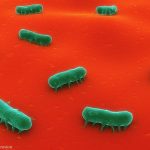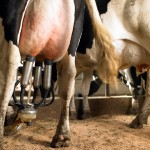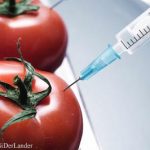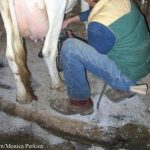The state of California may require paid sick leave for workers, which directly ties into food safety in restaurants. Legislation has been passed and Governor Jerry Brown is expected to sign it. AB 1522, the Health Workplaces, Healthy Families Act of 2014 passed the state Senate with a 22-8 vote and the Assembly with a 52-25 vote. Restaurant workers who work while sick have caused many foodborne illness outbreaks in the United States. A study by the Food Chain Workers Alliance in 2012 found that more than half of all workers in the food industry work while they are sick because they cannot afford to take time off. In 2013, a study by the Environmental Health Specialists Network, a collaborative project of the CDC, FDA, and USDA, found that sick worker policies "may be an important … [Read more...]
House Bill Would Ban Antibiotic-Resistant Bacteria: FSIS Responds
This week, House members Rosa DeLauro (D-CT) and Louise Slaughter (D-NY) introduced a bill that would ban antibiotic-resistant strains of Salmonella such as those that have sickened more than 600 people in the ongoing Foster Farms chicken outbreak. The bill would require the USDA to recall meat, poultry, or egg products that are contaminated with bacteria resistant to two or more critically important antibiotics or with bacteria or other pathogens that cause serious illness or death. The bill names Salmonella and Campylobacter as pathogens. Despite Foster Farms products sickening so many people (at least 17,000 with the multiplier), no recall has ever been issued from Foster Farms or the USDA. Seven strains of antibiotic-resistant Salmonella Heidelberg are present in the contaminated … [Read more...]
House Amendment Authorizes $1 Million for Food Safety
The U.S. House of Representatives passed an amendment last week that would authorize $1 million for food safety investigations. The amendment was sponsored by Reps. Mike Thompson (D-CA) and Jared Huffman (D-CA) was spurred by the huge Rancho Feeding Corporation recall of uninspected beef. That recall in the spring of 2014 covered more than 8 million pounds of beef: all of the meat it processed in 2013. The uninspected meat was sold in 35 states and in Guam. Thompson said in a statement, "with the Rancho recall, I witnessed firsthand the need for USDA's inspectors to have more resources so they can conduct better and more efficient investigations. From the beginning of the Rancho recall, public safety has been our number one concern. We can't let food get out that puts the health and … [Read more...]
Senate Amendment Requires Mandatory Labeling of GE Salmon
An amendment to the FY 2015 Agriculture Appropriations bill introduced passed in the Senate Appropriations Committee last week. It would require labeling of genetically engineered (GE) salmon. Senator Lisa Murkowski (R-AK) is the originator of the amendment, and Senator Mark Begich (D-AK) is the sponsor. This is the second year the Committee has passed a GE fish labeling amendment. Colin O'Neil, director of government affairs for Center for Food Safety said in a statement, "the food movement scored another major win today with the passage of Senator Murkowski's amendment to require the labeling of genetically engineered salmon. While some Members of Congress are peddling corporate-backed legislation to keep consumers in the dark, today's vote is an indicator that support for labeling is … [Read more...]
Raw Milk Bill Defeated in Louisiana
Louisiana House Bill 1279, which would have legalized the sale of raw milk in that state, failed in the Senate Committee on Health and Welfare. Legislators had concerns about the safety of unpasteurized milk. Agriculture Commissioner Mike Strain opposed the bill on safety grounds. A campaign called "I Love Raw Milk" was launched in support of the bill. The state has restrictive policies on the sale of raw milk. A Senate committee vote of 4-1 killed the bill. On May 7, 2014, the House approved the bill 78-19 after it was recommended on a close vote by the Committee on Agriculture, Forestry, Aquaculture and Rural Development. The law would have required registration of a farm of dairy, and posting signs at point of sale stating that "This produce, sold for personal use and not for … [Read more...]
Senators Want Robust Funding of PEDv Vaccine
Last week, six U.S. senators wrote a letter to the heads of the Senate and House Subcommittees on Agriculture, asking that the FY 2015 appropriations bill include funding for vaccinations against Porcine Epidemic Diarrhea virus (PEDv). Since the disease first emerged in April 2013, more than 6 million pigs have been killed in the U.S. The virus does not affect people. PEDv has an almost 100% mortality rate for piglets under two weeks old. The economic costs to producers are staggering. Many producers could go out of business if the disease continues to spread at its current rate. Pork prices are rising quickly since the supply of pork is decreasing. In addition, another emerging disease called swine delta corona virus is killing pigs and affecting many of the same producers hurt by … [Read more...]
Vermont Set to Enact Statewide GE Food Labeling Bill
The Vermont House voted to accept the Senate version of the GE labeling bill last week. Governor Shumlin is expected to sign the bill. All foods for sale in Vermont that are made with GE or GMO ingredients will have to carry a label effective July 1, 2016. The Center for Food Safety's executive director Andrew Kimbrell said, "this is an historic day for the people's right to know. It is now very clear that federal labeling of genetically engineered foods is going to happen in the foreseeable future. Should the industry try to challenge this law, Center for Food Safety will be there to help defend it and we are confident that it would survive any such challenge." While Vermont is not the first state to pass such a bill, it is the first bill that stands alone. No other states need to … [Read more...]
More Opposition to GMO Labeling Bill
Representative Mike Pompeo (R-KS), the single largest recipient of campaign funds from Koch Industries in 2010, introduced a bill to Congress last week titled the "Safe and Accurate Labeling Act of 2014" (HR 4432) that is anything but. The bill would stop states from requiring labels on food produced from genetically engineered (GE) and genetically modified (GMO) products. It would also make voluntary labeling for GE foods the national standard, ensure that GMOs can be labeled as "natural", and create its own rules for non-GMO labeling. Food and Water Watch opposes this bill, as it is written exactly as Monsanto, the corporation that holds most patents to GMO foods, would want. Politico leaked the language back in January 2014 as the work of the Grocery Manufacturers Association. That … [Read more...]
Cleveland and Pittsburgh Resolutions Against Antibiotic Use in Livestock
The cities of Cleveland and Pittsburgh have passed resolutions calling for a ban on the sub therapeutic use of antibiotics in livestock. The cities of Providence, Rhode Island and Redhook, New Jersey have also approved resolutions, and Seattle may join them soon. Seattle Council member Mike O'Brien said, "antibiotic resistance is a lot like the 'global warming' crisis of clinical medicine. It's a serious problem which will only worsen unless we take immediate action at all levels of government." The use of antibiotics for growth promotion and disease prevention in farm animals is linked to antibiotic resistance. Some antibiotics that are medically important for human beings are used on factory farms, endangering their use. In fact, the Foster Farms chicken Salmonella outbreak that has … [Read more...]
Maryland Raw Milk Bill Dies
Maryland House Bill 3, the legislation that would have allowed individual cow-share or herd-share in that state, making raw milk legal, is dead. The bill was stuck in committee after a report by the Department of Legislative Services found that the bill would double raw-milk outbreaks and increase the number of individual illnesses from raw milk. That study showed that making raw, or unpasteurized, milk legal would increase government costs in that state by at least $66,000 per year, up to $95,000 per year in four years. That is independent of the costs of illness, medical bills, and lost wages. Dr. Katherine Feldman, of the Maryland Health Department's infectious diseases bureau, said that "pasteurization if the cornerstone of milk safety and a triumph of public health." States … [Read more...]













